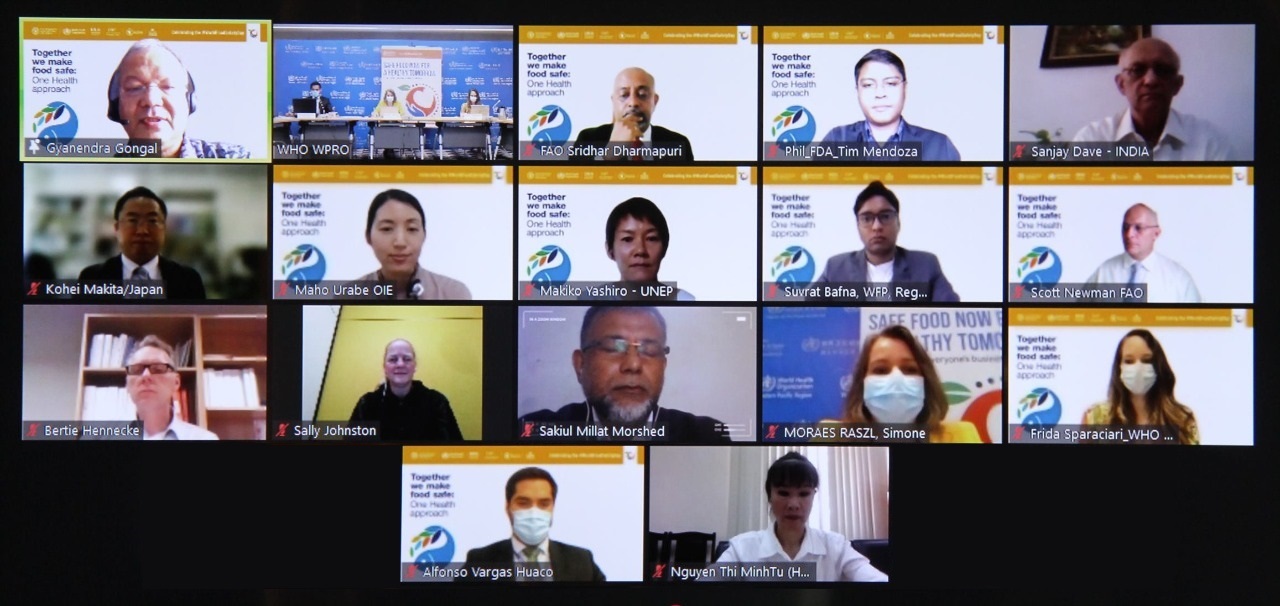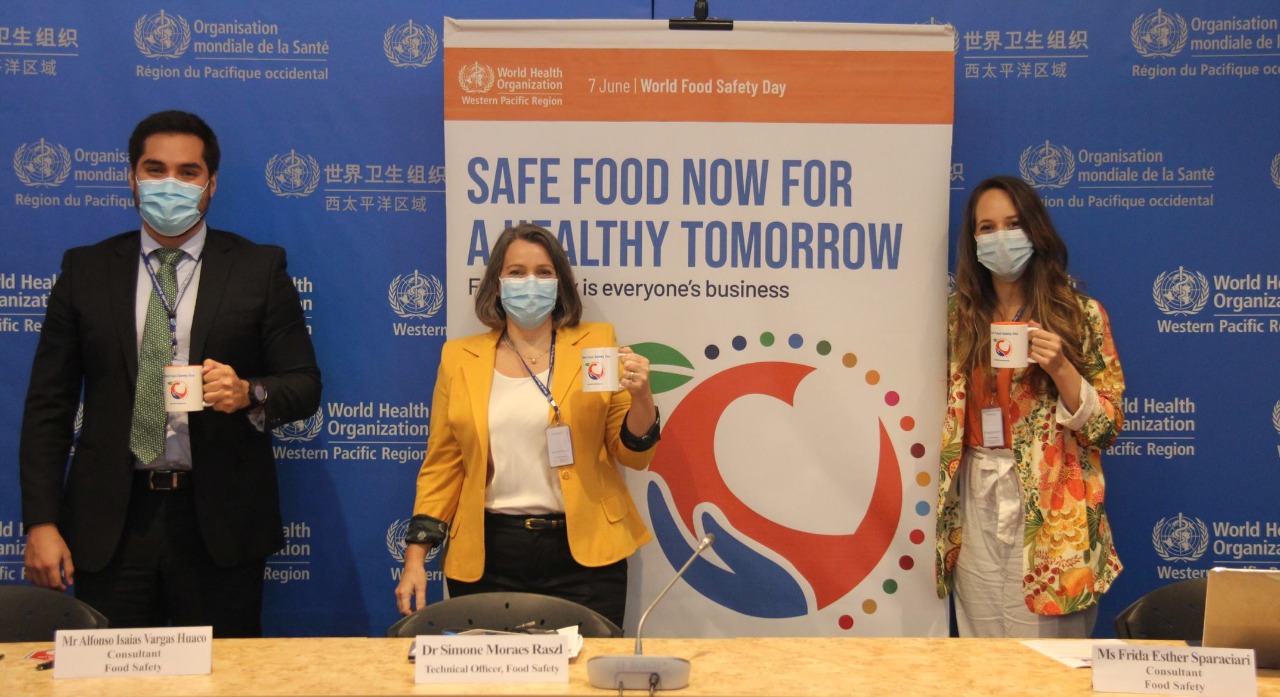Collaboration and education held up as keys to a food safe future in multiagency discussion for World Food Safety Day
In anticipation of the 7 June World Food Safety Day celebrations, the World Health Organization (WHO), the Food and Agriculture Organization of the United Nations (FAO), the World Organization for Animal Health (OIE), the United Nations Environment Programme (UNEP) and the World Food Programme (WFP) held a joint event this morning to explore and discuss the One Health approach to food safety. The event had an audience of nearly 400 participants from 69 countries in Zoom, plus 320 in YouTube.
The proceedings for the two-part event were introduced by WHO’s Simone Moraes Raszl, Food Safety Technical Officer for the Western Pacific Region Office, who explained that a One Health approach involves consideration of human health, animal health and environmental health. As such, for the first part of the event, there was a series of five presentations from representatives of different food-related sectors, who explained the role of their work in food safety.
Dr Bertie Hennecke from Australia’s Department of Agriculture, Water and the Environment gave a presentation on plant production and health, where he explained that plant health is integral to food safety, and that within the sector, “everyone has a role to play”: from the farm, where good practices reduce the need for chemical pest and disease control, to the international level and the responsibilities of the International Plant Protection Convention (IPPC) and then governments and regulators at a national level.

Webinar panelists discuss the One Health approach to food safety
Following on from this, Dr Kohei Makita from the Rakuno Gakuen University, OIE Collaborating Centre for Food Safety in Japan, looked at the ways in which animal health can contribute to the safety of food. From production to processing and then standard setting by the OIE, there are ways of reducing risk, that animal-source food producers and processors can abide by. The role of the environment and food safety was the subject of Kakuko Nagatani-Yoshida’s presentation. Speaking on behalf of UNEP’s Asia and Pacific Office, she used some worrying statistics to outline the environmental hazards that threaten our health and food supply, including “persistent and hazardous pollutants,” unhealthy levels of air pollution, biodiversity loss and loss of habitats and waste food and waste plastic.
Sally Johnston, Director Paetae Kairangi, Ministry of Primary Industries in New Zealand illustrated the benefits of a collaborative approach to food safety with a story about how understanding all parts of the food chain, even those you don’t work in, can help with understanding food safety hazards and this can lead to collective problem solving. And finally, former Chairperson of the Codex Alimentarius Commission, Sanjay Dave, explained the role of Codex and food standards in keeping food safe.
The second part of the event was a panel discussion on the benefits of and different perspectives to a Food Systems approach to food safety. Moderated by FAO’s Sridhar Dharmapuri, contributors came from academia, government, smallholder farming and a consumer rights organization. While they each came from different countries and represented different parts of food safety, what emerged from the discussion was a consensus that education is key for all stakeholders and that food safety depends also on a collective and cooperative approach. It was also clear from all contributors that governments should lead, in an inclusive and harmonized way, on establishing robust food safety systems.

The WHO WPRO team celebrates World Food Safety Day
Panel contributors were: Professor Nguyen Thi Minh Tu, School of Biotechnology and Food Technology, Hanoi University of Sciences and Technology, Vietnam; Timothy Mendoza, Food and Drug
Administration, Philippines; Sakiul Millat Morshed, SHISUK, Bangladesh; and Dan Kakaraya, Consumer Foundation Association, Papua New Guinea.
The recorded event is now available on Youtube:
https://www.youtube.com/watch?v=aDjkBxp9Woo
It was also featured as part of WHO’s Health Talks series:
https://healthtalks.foodsystemsforhealth.org/talks/food-safety-in-the-context-of-food-systems/
At the heart of the Codex mandate are the core values of collaboration, inclusiveness, consensus building and transparency. Governmental and non-governmental, public and private organizations alike play a vital role in ensuring Codex texts are of the highest quality and based on sound science.
Codex would have little authority in the field of international standard setting if it did not welcome and acknowledge the valuable contributions made by observers. Expert technical bodies, industry and consumer associations
contribute to the standard-setting process in a spirit of openness, collaboration and transparency.
Intergovernmental organizations (IGOs) and international non-governmental organizations (NGOs) can apply for observer status in Codex in order to attend and put forward their views at every stage of the standard-setting process.
 Current Codex Alimentarius Commission
Current Codex Alimentarius Commission
Collaboration and education held up as keys to a food safe future in multiagency discussion for World Food Safety Day
In anticipation of the 7 June World Food Safety Day celebrations, the World Health Organization (WHO), the Food and Agriculture Organization of the United Nations (FAO), the World Organization for Animal Health (OIE), the United Nations Environment Programme (UNEP) and the World Food Programme (WFP) held a joint event this morning to explore and discuss the One Health approach to food safety. The event had an audience of nearly 400 participants from 69 countries in Zoom, plus 320 in YouTube.
The proceedings for the two-part event were introduced by WHO’s Simone Moraes Raszl, Food Safety Technical Officer for the Western Pacific Region Office, who explained that a One Health approach involves consideration of human health, animal health and environmental health. As such, for the first part of the event, there was a series of five presentations from representatives of different food-related sectors, who explained the role of their work in food safety.
Dr Bertie Hennecke from Australia’s Department of Agriculture, Water and the Environment gave a presentation on plant production and health, where he explained that plant health is integral to food safety, and that within the sector, “everyone has a role to play”: from the farm, where good practices reduce the need for chemical pest and disease control, to the international level and the responsibilities of the International Plant Protection Convention (IPPC) and then governments and regulators at a national level.

Webinar panelists discuss the One Health approach to food safety
Following on from this, Dr Kohei Makita from the Rakuno Gakuen University, OIE Collaborating Centre for Food Safety in Japan, looked at the ways in which animal health can contribute to the safety of food. From production to processing and then standard setting by the OIE, there are ways of reducing risk, that animal-source food producers and processors can abide by. The role of the environment and food safety was the subject of Kakuko Nagatani-Yoshida’s presentation. Speaking on behalf of UNEP’s Asia and Pacific Office, she used some worrying statistics to outline the environmental hazards that threaten our health and food supply, including “persistent and hazardous pollutants,” unhealthy levels of air pollution, biodiversity loss and loss of habitats and waste food and waste plastic.
Sally Johnston, Director Paetae Kairangi, Ministry of Primary Industries in New Zealand illustrated the benefits of a collaborative approach to food safety with a story about how understanding all parts of the food chain, even those you don’t work in, can help with understanding food safety hazards and this can lead to collective problem solving. And finally, former Chairperson of the Codex Alimentarius Commission, Sanjay Dave, explained the role of Codex and food standards in keeping food safe.
The second part of the event was a panel discussion on the benefits of and different perspectives to a Food Systems approach to food safety. Moderated by FAO’s Sridhar Dharmapuri, contributors came from academia, government, smallholder farming and a consumer rights organization. While they each came from different countries and represented different parts of food safety, what emerged from the discussion was a consensus that education is key for all stakeholders and that food safety depends also on a collective and cooperative approach. It was also clear from all contributors that governments should lead, in an inclusive and harmonized way, on establishing robust food safety systems.

The WHO WPRO team celebrates World Food Safety Day
Panel contributors were: Professor Nguyen Thi Minh Tu, School of Biotechnology and Food Technology, Hanoi University of Sciences and Technology, Vietnam; Timothy Mendoza, Food and Drug
Administration, Philippines; Sakiul Millat Morshed, SHISUK, Bangladesh; and Dan Kakaraya, Consumer Foundation Association, Papua New Guinea.
The recorded event is now available on Youtube:
https://www.youtube.com/watch?v=aDjkBxp9Woo
It was also featured as part of WHO’s Health Talks series:
https://healthtalks.foodsystemsforhealth.org/talks/food-safety-in-the-context-of-food-systems/
 Codex and Observer
Codex and Observer
around the world since ancient times.
We might not always know where it comes from,
but we expect it to be available, safe and of good quality.









Leave a comment